72% of Organizations have adopted AI in at least one business function. (McKinsey, 2024).
AI has transformed the way organizations rethink their business strategies. It is no longer a trend but a game-changing use of technology in different business verticals, including marketing, sales, customer service, project delivery, and more.
AI has come a long way from automating mundane tasks to creating powerful models that supercharge predictions and forecasting! Using data and analytics, AI for business improves decision-making by turning challenges into opportunities and driving innovation and growth in different business departments.
If you’re still wondering, HOW, here’s a little spoiler: Virtual assistants in customer service resolve customer queries 24/7 in real-time, AI in sales can help in lead forecasting and automating follow-up tasks, and HR executives can automate talent screening and streamline the onboarding process.
These are just to name a few! The AI advantage for businesses is astounding, as its use leads to a significant spike in employee productivity, automation of routine tasks, and a boost in ROI.
In this blog, we’ll dive into the impact of AI on businesses and how it can improve collaboration and help serve customers better.
AI for Business and Its Power to Drive Success
AI, or artificial intelligence, is the ability of computers to perform tasks associated with human intelligence. These include predicting, reasoning, learning from past experiences, forecasting, and decision-making. AI capabilities integrated in computers and machines can sort through data sets to understand past patterns and predict future behavior. AI uses a wide range of technologies like machine learning, deep learning, computer vision, and robotics. AI systems leverage huge volumes of datasets gained from different sources to train their models and adapt to the changing scenarios.
5 Benefits of AI for Business
Can AI replace human intelligence and capabilities? Afraid not! This is a far-fetched thought at present, as AI lacks human emotions and understanding and can only augment human capabilities instead of replacing them completely. Humans and AI can work in solidarity to simplify complex issues and drive business productivity.
According to PWC, AI is expected to improve productivity by 40% by 2035.
According to Forbes Advisor, 64% of business owners believe AI improves customer relationships.
Six of ten current occupations have more than 30% of activities which are technically automatable and do not require human intervention.
Despite having concerns about the application of AI in various businesses and verticals, 65% of consumers have trust in the businesses that use AI technology.
Use of artificial intelligence in business provides increased transparency, operational efficiency and personalization. AI offers smarter solutions, and personalized experiences boosting customer satisfaction and loyalty.
Here are the Key Takeaways of Integrating AI Into Business Processes:
1. Improves Business Productivity
AI improves business efficiency and productivity by automating repetitive tasks, providing data-driven insights, and streamlining operations. By automating repetitive tasks, AI can save employees time and productivity as they can work on value-added tasks. With data analysis, businesses can understand customer trends and tailor their outreach strategies accordingly.
2. Enhances Customer Experience
Artificial intelligence in business is a major driver in boosting customer experience by providing personalized interactions. By analyzing customer data, artificial intelligence can identify customer behavior, preferences, and past trends to predict future outcomes. This allows businesses to personalize their communication with customers and retain their loyalty to the brand.
3. Augments Decision-Making
AI helps businesses stay competitive in the rapidly evolving environment by speeding up the decision-making process. AI systems can analyze large datasets and generate real-time insights, which would have been a tedious process for humans. These insights provide a deep dive into customer needs and respond with swift decisions. By automating routine tasks, AI empowers decision-makers to focus on more strategic initiatives that drive efficiency.
4. Provides Cost-Savings
Leveraging AI, businesses can automate routine tasks and reduce errors in areas like finance, logistics, and customer service. The use of AI can also optimize resource and inventory management, which helps avoid unnecessary costs. Finally, AI for businesses can boost marketing ROI using data analytics to identify and focus on high-value prospects with targeted campaigns. This personalization prevents spending on ineffective campaigns and reduces lead acquisition costs.
5. Drives Innovation
The use of AI in business drives innovation in business by analyzing market trends, predicting customer needs, and personalizing product or service recommendations using generative AI. AI consulting services facilitate enterprises to automate routine tasks to focus on high-value customer engagement activities with innovative ideas that enhance operations and drive success.
How is Artificial Intelligence Shaping the Modern Business Landscape?
AI is at the forefront of modern business, powering every facet from customer service to project management, driving productivity, enhancing efficiency, and boosting customer success. Customer service uses chatbots to provide omnichannel support, marketing can optimize campaigns with personalized strategies, sales can analyze data to prioritize valuable leads, finance can detect fraud, and project management can optimize workflows and achieve delivery deadlines.
AI-Powered Customer Service: 24/7 Support, Faster, Smarter and Effortless
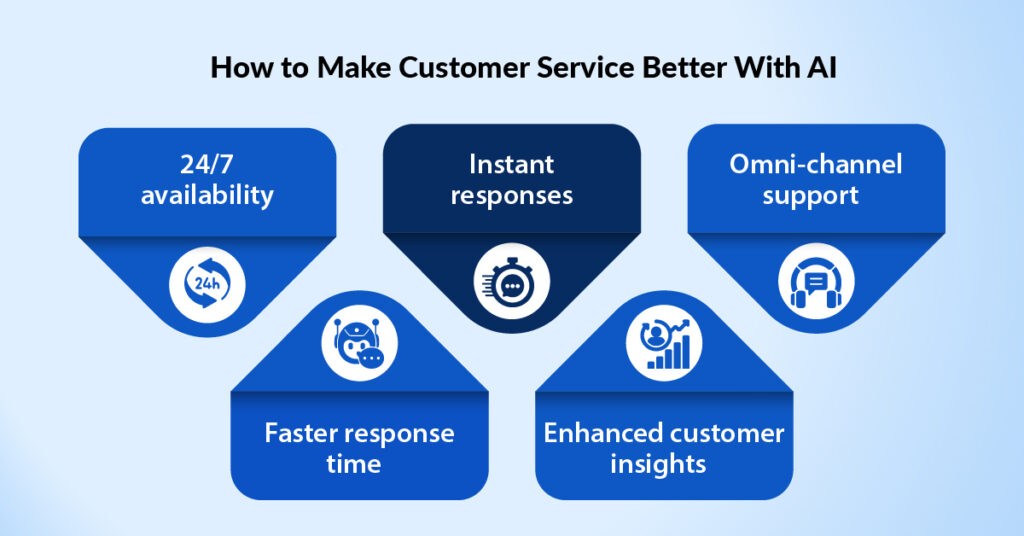
Businesses implementing AI in customer service workflows can transform ways in which they connect with their customers.
1. 24/7 Availability
AI-powered chatbots can address all basic queries of customers, anytime, anywhere. These chatbots answer common questions, troubleshoot customer issues, and escalate complex cases to the right agent. Leveraging data, AI impact on business can provide complete insights into customer records and provide personalized service.
2. Instant Responses
Using AI, enterprises can reduce service resolution time by answering common questions. This improves service agent productivity and helps them exceed customer expectations efficiently.
3. Omni-Channel Support
AI tools resolve customer queries across any channel like mobile, web, email, phone, text, etc. This allows a seamless experience for the customers, as they can get personalized support in their preferred mode of communication with higher efficiency.
4. Faster Response Time
AI-powered chatbots reduce response times of/ agents by resolving issues automatically. With multi-channel support, businesses can address customer queries quickly, thus reducing the service response time.
5. Enhanced Customer Insights
AI in business analyzes customer data to help businesses gain insights into customer behavior and preferences. By viewing past purchases, customer preferences and buying habits, artificial intelligence tools can identify patterns and create proactive strategies to improve experience.
AI-Driven Marketing: Crafting Personalized Experiences with Meaningful Insights
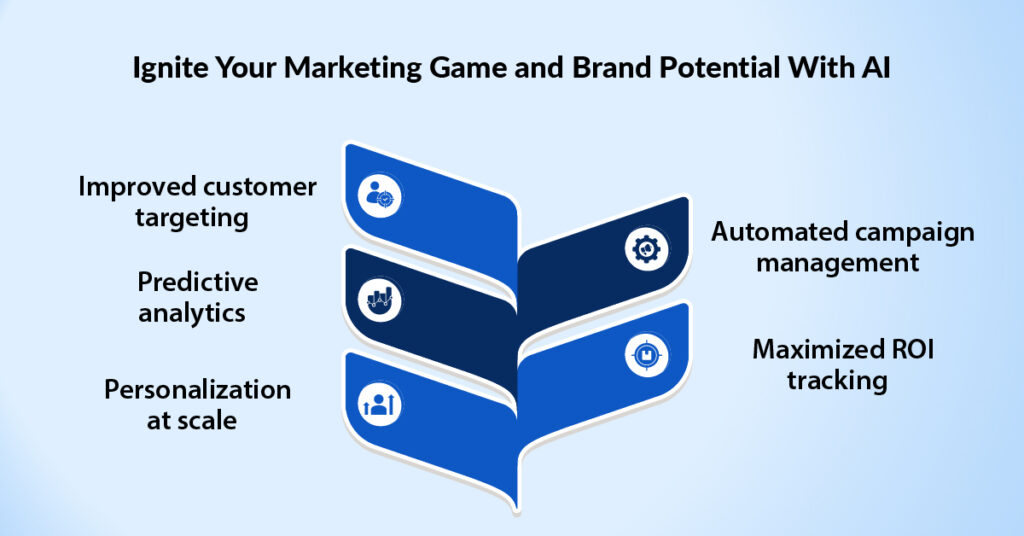
Among the different business verticals of the modern enterprise, marketing has gained tremendously with AI.
1. Improved Customer Targeting
AI tools analyze huge volumes of customer data to derive insights from behavior, demography, browsing history, buying trends, etc. Based on these insights, AI can segment customers into different categories. Marketers create then create highly personalized content that addresses the needs and interests of specific segments.
2. Automated Campaign Management
Imagine streamlining the marketing processes to free up staff while providing personalized experiences to customers. AI automates routine tasks like email marketing, social media marketing, posting schedules, and tracking engagement metrics. This helps the marketing team focus on innovation, driving productivity, and improving marketing performance.
3. Predictive Analytics
AI-powered predictive analysis empowers marketers with a sixth sense of customer needs and trends. AI analyzes historical data to identify spikes in product demand and forecast future buying trends. Using these insights, the marketing team can plan campaigns that resonate most with the customers. With these improved strategies, brands can deliver the right customer experience at the right time.
4. Maximized ROI Tracking
Businesses can optimize their product or service delivery by tracking and analyzing their marketing initiatives. AI for businesses tracks data from different sources like emails, social media campaigns, and website analytics to gain actionable insights. By tracking these metrics, businesses can understand the effectiveness of marketing campaigns, make informed decisions, and maximize ROI.
5. Personalization at Scale
How does AI provide personalized customer experiences with its game-changing technology? By analyzing huge volumes of data, AI can tailor engagement strategies that resonate with each customer. Using artificial intelligence, businesses can also identify past patterns to predict future trends and curate strategies across multiple channels. This increases the likelihood of conversion and boosts business.
AI Advantage: Boosting Sales Team Performance for Higher Conversions
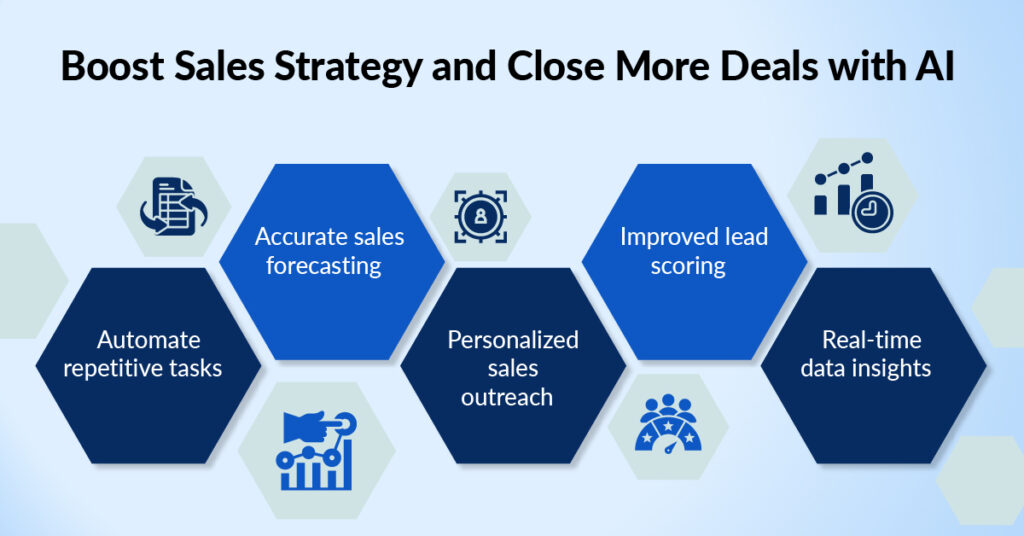
Artificial intelligence revolutionizes the sales team by leveraging powerful tools and insights to lead forecasting and conversion driving business growth.
1. Automate Repetitive Tasks
Businesses integrating AI into their sales operations can automate repetitive tasks like data entry, scheduling and follow-up tasks. This enables them to optimize their efforts for more strategic initiatives. Streamlined workflows improve sales team productivity as they can focus on meaningful conversations with clients to boost success.
2. Accurate Sales Forecasting
Artificial intelligence in business improves the accuracy of sales forecasting by analyzing historical customer data and marketing KPIs. Armed with these insights, businesses can create more realistic targets, optimize resource allocation, manage inventory effectively and maximize ROI. Better forecasting helps the sales team to anticipate potential roadblocks and curate proactive strategies.
3. Personalized Sales Outreach
AI analyzes customer profiles and preferences and creates tailored sales outreach strategies. This level of personalization improves engagement as sales reps can deliver value added propositions that resonate with lead interests, thus increasing the chances of conversions. AI-powered analytics helps sales reps connect with customers at a deeper level fostering meaningful connections.
4. Improved Lead Scoring
AI in business algorithms analyzes vast sets of customer data in a short time to derive meaningful insights. Using these insights, businesses can focus on prospects who have a high potential of converting to customers. By analyzing engagement history, demographic behavior, and buying patterns, sales teams can create targeted strategies that drive loyalty and boost revenue growth.
5. Real-Time Data Insights
Leveraging artificial intelligence, businesses can gain insights into sales performance, market conditions, and customer trends. Reports and dashboards reflect key sales metrics, enabling the team to make data-driven decisions by personalizing strategies that cater to customer interests and preferences.
AI-driven Insights: Supercharging the Future of Financial Operations with Data
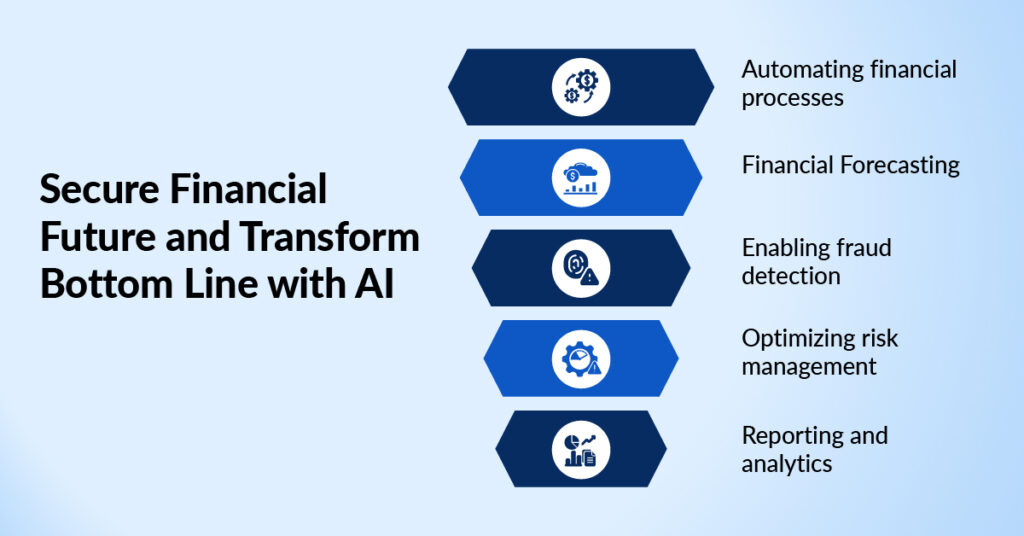
AI in financial services transforms finance management in different ways by streamlining processes, generating insights, identifying potential risks, and making intelligent decisions.
1. Automating Financial Processes
Using AI, the finance teams can automate routine tasks like invoice processing, data entry, reconciliation, payment execution, and more. This helps to reduce human errors and free them to perform more value-added tasks. The results are higher efficiency and cost savings in the financial sector.
2. Financial Forecasting
AI in financial services uses historical data to predict trends, revenue, and expenses, leading to more optimized financial planning. Based on past data insights, businesses can forecast future trends to make proactive decisions using generative AI in financial services. This leads to smart investment strategies that drive revenue flow.
3. Enabling Fraud Detection
Artificial intelligence in finance can analyze huge volumes of customer transactions to identify mismatches and errors. By detecting these patterns in real time, businesses can uncover potential fraud. This helps them prevent financial losses, strengthen financial security, and create secure processes.
4. Optimizing Risk Management
AI analyzes vast amounts of data, like customer credit history, economic conditions, and changes in market conditions, to identify potential risks. Using these insights, finance teams can make data-driven decisions that ensure intelligent financial management processes.
5. Reporting and Analytics
The use of AI in business automates reporting and analysis, helping teams gain clear insights into financial performance. Leveraging AI, the finance teams can process large volumes of data and create reports highlighting the key performance metrics that empower the finance team to make data-driven decisions. Streamlined reporting and analytics help the finance team improve financial workflows and drive meaningful business outcomes.
AI in Project Management/Delivery: Accelerating Project Success with Data-Driven Insights
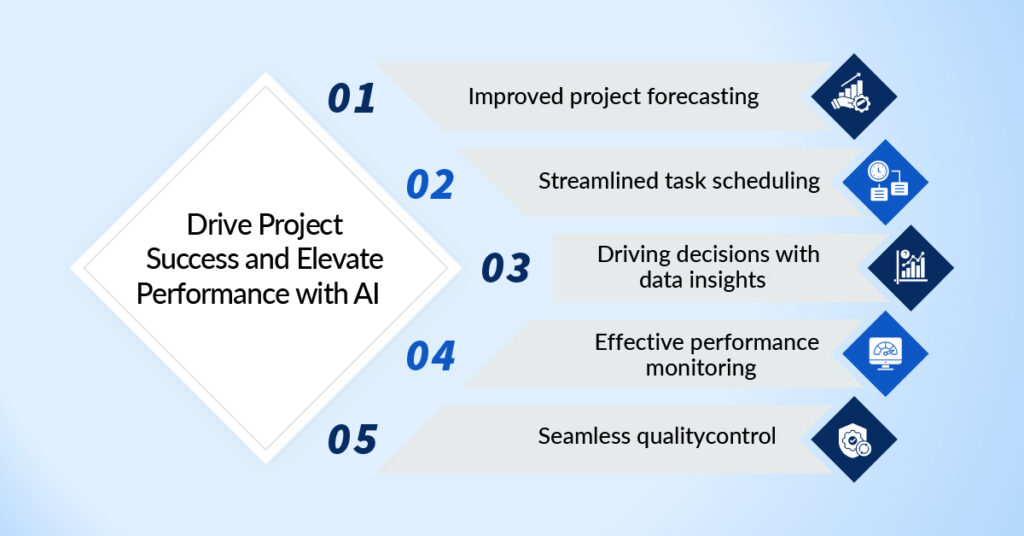
Struggling to manage complex projects and aggressive deadlines? The AI advantage in project management/delivery is the all-in-one solution that streamlines operations, improves collaboration, and helps deliver projects on time.
1. Improved Project Forecasting
Predictive analytics in AI can analyze past data on project management to forecast potential pitfalls in advance. Project managers can identify errors in advance, create troubleshooting strategies to reduce delays, and improve project performance.
2. Streamlined Task Scheduling
AI integration in project management workflows helps to automate task scheduling, ensuring that the right resources get the right tasks. This maximizes resource allocation and improves project efficiency. It also addresses the sudden changes in project requirements and helps businesses achieve project deadlines effectively.
3. Driving Decisions with Data Insights
AI tools analyze large datasets to equip project managers with insights that will speed up project delivery. Routine task automation enables managers to focus on strategic decisions that drive project success. AI analyzes KPIs to predict potential roadblocks, reduce project delays, and improve the overall project outcome.
4. Effective Performance Monitoring
The advantages of AI in project delivery include tracking and monitoring deadlines, team performance, task completion rates, and efficiency. These insights provide valuable insights into project status, identify issues, and make data-driven decisions that trigger success.
5. Seamless Quality Control
Project quality is an important parameter that drives outcomes and defines success. By integrating AI-powered tools in project management, businesses can predict possible errors and potential delays and recommend strategies to achieve deadlines and improve efficiency and enhance project quality.
Wrapping Up
Artificial intelligence in business is no longer an afterthought but a must-have technology that harnesses advanced tools to supercharge business workflows, accelerate operations, improve productivity, and maximize ROI. If you are still wondering how businesses use artificial intelligence, here is the answer! AI powers every corner of business—from sales/marketing to project management/delivery. By automating business functions, predicting customer preferences, and delivering personalized services, AI in business advantage dictates how organizations connect with customers to reduce bottlenecks, bring down costs, and maintain a competitive edge.
Discover how an expert AI consultant can transform your business strategies with data-driven decisions for lasting success.
Author

Global COO, AblyPro

For 20 years, Neeraj has worked alongside a multitalented team to help associations and nonprofits drive digital transformation within their organization, enabling them to be more innovative, agile, and donor/member-centric. As AblyPro’s Global COO, he leads an internal task force that shares lessons learned, best practices, and practical applications that specifically relate to associations and nonprofits. With 300+ developers by his side, Neeraj provides clients with the resources and capacity to power up their teams.





